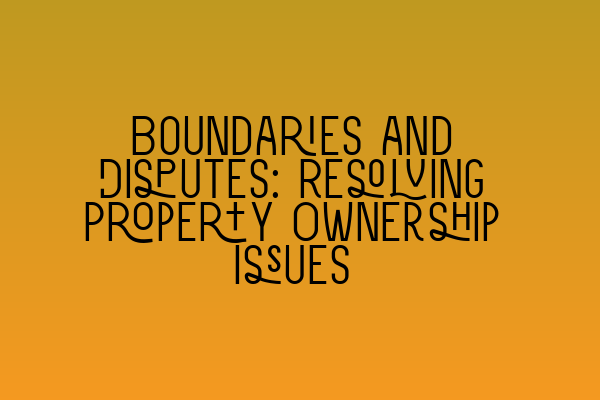Boundaries and Disputes: Resolving Property Ownership Issues
When it comes to owning a property, boundaries play a significant role in defining the extent of your ownership. However, disputes regarding property boundaries are not uncommon and can often lead to legal complications and conflicts among neighbors. As a solicitor specializing in property law at SQE Property Law & Land Law, I have encountered numerous cases where resolving property ownership issues regarding boundaries has been crucial. In this blog post, I will explore the importance of boundaries and provide insights into resolving disputes effectively.
The Significance of Boundaries
Boundaries serve as the physical markers that define the limits of a property. Accurate boundaries are essential for defining ownership, establishing rights and responsibilities, and maintaining peaceful coexistence between neighbors. They not only provide clarity but also protect the interests of property owners.
However, boundaries can be subject to misinterpretation, errors, or even intentional encroachments, leading to disputes. These disputes can arise due to various reasons, such as:
- Unclear or poorly defined boundary lines
- Disagreements over historical use or possession of land
- Boundary changes due to land development or modifications
- Unlawful encroachments by neighboring property owners
Resolving these property ownership issues requires a thorough understanding of property law and effective negotiation strategies. As a specialist solicitor, I have assisted clients in resolving such disputes, helping them regain clarity over their property boundaries and protect their rights.
Resolving Property Ownership Disputes
When faced with a property ownership dispute, it is crucial to approach the situation with a calm and rational mindset. Here are some steps and strategies that can be employed to effectively resolve such disputes:
1. Communication and Mediation
The first step in resolving any boundary dispute is open and transparent communication with the other party involved. Reach out to your neighbor or the property owner in question and express your concerns. Maintain a constructive dialogue and explore the possibility of reaching a mutually satisfactory resolution without involving legal proceedings. Mediation, facilitated by a neutral third party, can also be an effective means of resolving disputes amicably.
Understanding Contractual Capacity: Rights and Limitations
2. Professional Boundary Survey
If direct communication and mediation efforts fail to resolve the dispute, it may be necessary to enlist the services of a professional surveyor. A boundary survey will accurately determine the exact location of the property boundaries, providing objective evidence to support your claim. This survey can serve as a crucial piece of evidence during legal proceedings, should they become necessary.
3. Legal Advice and Representation
In complex and contentious disputes, seeking legal advice from a property law specialist is essential. A solicitor with expertise in property disputes can assess your case, provide legal guidance, and represent you effectively in negotiations or legal proceedings. They will thoroughly analyze the relevant laws and regulations, review any pertinent contracts or agreements, and develop a strong legal strategy to protect your rights.
Interactive SQE Mock Tests for Contract Law: Test Your Knowledge
4. Alternative Dispute Resolution
In certain situations, alternative dispute resolution methods, such as arbitration or expert determination, can be explored to avoid lengthy and costly court proceedings. These methods involve the appointment of an impartial expert or arbitrator to make a binding decision on the dispute. They can be quicker and more cost-effective than traditional litigation, allowing for a swift resolution to the dispute.
5. Court Proceedings
If all other attempts to resolve the dispute have been exhausted, it may be necessary to initiate court proceedings to protect your rights. In court, a judge will carefully consider the evidence presented by both parties and make a legally binding decision. It is crucial to have a skilled solicitor by your side who can navigate the legal complexities of the court system and present a strong case on your behalf.
Join Our SQE Contract Law Webinars: Expert Insights and Guidance
Conclusion
Resolving property ownership issues related to boundaries is essential for maintaining peaceful and harmonious relationships with neighboring property owners. By following the steps outlined above and seeking professional legal advice, you can effectively navigate through boundary disputes, secure your property rights, and find a satisfactory resolution.
At SQE Property Law & Land Law, our team of property law specialists is ready to assist you in resolving any property ownership issues you may be facing. We have extensive experience in handling boundary disputes and can provide you with expert guidance and representation throughout the process.
